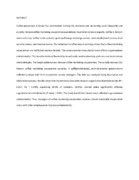The influence of shared vision on organizational ambidexterity in coffee marketing co-operative societies in Kenya.

View/
Date
2023-07Author
Wanjau, Kenneth
https://orcid.org/0000-0002-3146-5324
Kiai, Richard
Metadata
Show full item recordAbstract
Coffee production in Kenya has plummeted, hurting the economy and worsening social inequality and
poverty. Kenyan coffee marketing cooperative associations have failed to boost exports. Coffee is
Kenya's main cash crop. Coffee is the country's principal foreign exchange earner, rural employment
source, food security source, and revenue source. The reduction in coffee export earnings shows that
coffee marketing cooperatives are inefficient and less flexible. This study examines how shared vision
affects organizational ambidexterity. This transformational leadership-based study used exploratory
and cross-sectional survey methodologies. The target audience was Kenyan coffee marketing
cooperatives. The sample size was 242 Kenyan coffee marketing cooperative societies. A self administered, semi-structured questionnaire collected primary data from cooperative society
managers. The data was analyzed using descriptive and inferential statistics. Results show that shared
vision favorably impacts organizational ambidexterity (R = 0.547, R2 = 0.299), explaining 29.9% of
variation. Further, shared vision significantly affected organizational ambidexterity (P-value = 0.00).
The study found that shared vision affected organizational ambidexterity. Thus, managers of coffee
marketing cooperative societies should constantly discuss their vision with other employees to improve
ambidexterity.
URI
https://www.ssbfnet.com/ojs/index.php/ijrbshttps://karuspace.karu.ac.ke/handle/20.500.12092/2983